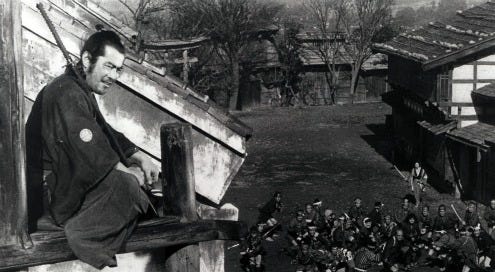Yojimbo (1961)

I have a suggestion that may shock some students of Japanese filmmaker Akira Kurosawa: "Yojimbo" is actually a comedy.
The 1961 jidaigeki (period drama) is representative of Kurosawa's career: A lone warrior finds himself at the center of a struggle between two gangs running an isolated town and works to leverage the situation to his advantage. The movie was greatly inspired by American Westerns, especially the final showdown with a duel in the street (though our hardy protagonist takes on 10 villains, not just one).
In turn, "Yojimbo" became a touchstone for Westerns and other genre films, essentially launching the Spaghetti Western movement with the 1964 Sergio Leone remake, "A Fistful of Dollars." Consider: No "Yojimbo," and today Clint Eastwood would probably be (barely) remembered as a TV star.
So many memes emerged from this film that would affect cinema for decades hence, especially the idea of the "man with no name," where the identity and background of the hero is less important than the actions he takes. Also notable is that the protagonist takes great pains to present himself as an opportunistic mercenary but repeatedly performs altruistic acts in the face of depravity (often paying a harsh personal price for his good deeds).
But what gets lost in all this discussion about the film's iconic status is just how damn funny it often is.
Start with the rambunctious, percussive musical score by Masaru Satô, especially the jaunty little march that accompanies the ronin (masterless samurai) whenever he is about to take some significant action. Listening to that jig while he saunters boldly up the street gives the impression of a preening rooster reveling in his status as the cock of the walk.
Clearly, the hero himself (Kurosawa mainstay Toshirô Mifune) enjoys the action unfolding in front of him, often commenting upon how entertaining or amusing he finds the conflict between the two gangs. The epitome of this is when he positions himself upon a tower to watch the coming battle between the henchman of Ushitora (Kyû Sazanka) and Seibei (Seizaburô Kawazu) in the street below. He laughs at their posturing and halfhearted charges, which invariably falter as they approach the enemy and actual bloodshed is threatened.
One of the running jokes in the movie is how terrible all the warriors are except for Two Bit — as the ronin is disparagingly nicknamed by Ushitora's men. Expert combat skills are a hallmark of Kurosawa's films, as evidenced by "The Seven Samurai" and other movies where samurai spend their entire lives honing amazing abilities with the blade. In "Yojimbo," the henchmen recruited by the two sides are runaway farm boys and small-time thieves who rely more on bullying than actual skill.
For all we know, Two Bit may be an only modestly talented combatant, but compared to the scags he's up against, he's a whirlwind who goes through them like butter. He takes on six at once without breaking a sweat, and even the final showdown versus 10 is only marginally tougher for him.
For Kurosawa to make a movie in which skill at swordplay is so terrible is a pun in of itself ... imagine John Ford making a Western where nobody could hit anything with a six-shooter.
It also seems that the ronin doesn't take himself too seriously, either. As the film opens, he comes across a fork in the road and throws a stick in the air to decide what direction to take. He also declines to give anyone in the town his real name, staring out a the window before offering "Kuwabatake Sanjuro," or "30-year-old mulberry field." He also has the playful habit of tucking his arms inside his robes, reaching through the neck hole to scratch at his whiskers in a display of uncouth casualness.
Whether or not you agree that "Yojimbo" — the title means "bodyguard" — is intentionally funny, it's hard to deny that it's one of the truly great Japanese films.
5 Yaps



